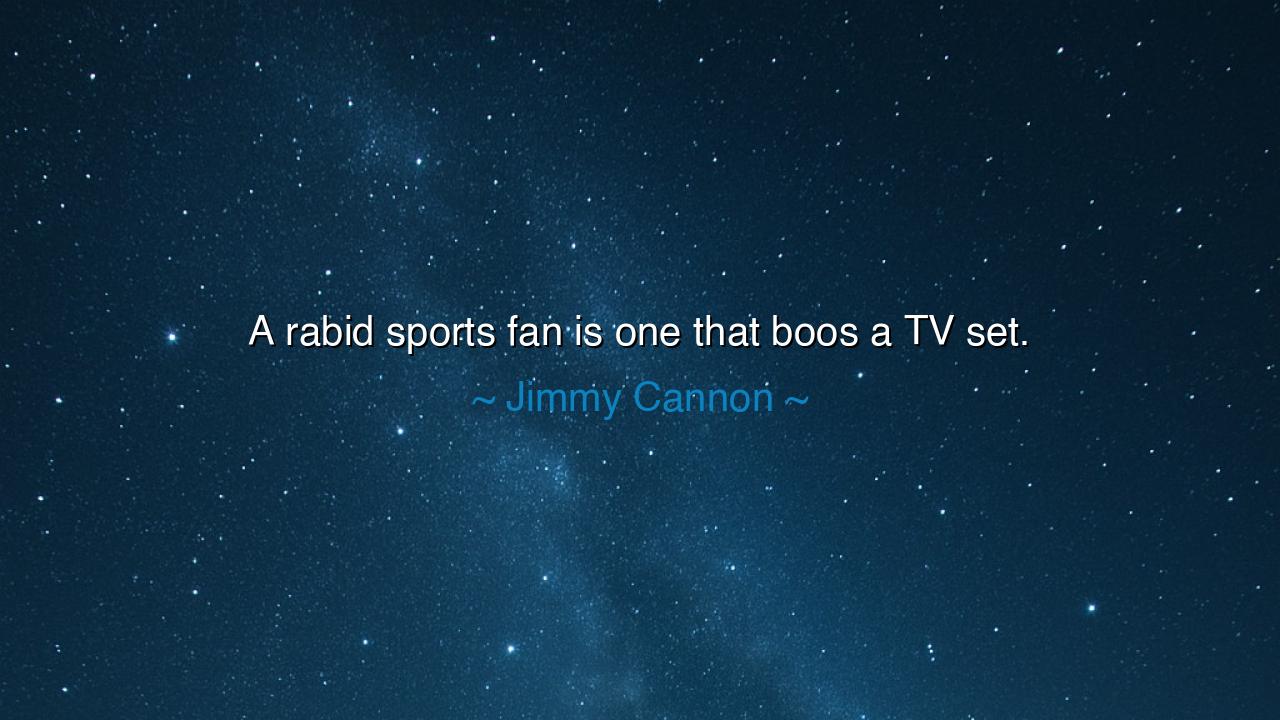
A rabid sports fan is one that boos a TV set.






Hear the wit of Jimmy Cannon, who once observed with piercing humor: “A rabid sports fan is one that boos a TV set.” Though light in form, these words contain a deep truth about passion, devotion, and the strange ways in which human desire expresses itself. They reveal not just the spirit of games, but the spirit of people, and how love, when bound too tightly, can turn to frenzy.
When Cannon speaks of the rabid sports fan, he does not mean mere admiration, but obsession—an energy so intense it spills beyond reason. To boo a living athlete in the stadium is understandable: they hear you, they see you, they stand before you in flesh and sweat. But to boo a lifeless TV set is to cross into another realm: one where passion detaches from logic and becomes a theater of its own. In this moment, the fan is not only watching the game—they are living inside it, as though their cries could alter destiny.
Such devotion is both noble and dangerous. Noble, because it reveals the strength of loyalty, the fire of community, the willingness of a soul to give itself wholly to something beyond itself. Dangerous, because when passion blinds, it can rob a man of balance, consuming his reason in the flames of excess. Here lies the double edge of zeal: it can elevate the spirit or imprison it.
History offers parallels. Recall the chariot races of ancient Rome, where the fans of the Blues and Greens filled the Circus Maximus. Their devotion went beyond cheers: riots erupted, lives were lost, even emperors trembled before the wrath of supporters whose identity was bound so tightly to the fate of their team. What Cannon describes with a smile, Rome endured in blood. From these stories we see how the joy of games, when swollen to frenzy, can become something darker.
Yet Cannon’s words are not condemnation alone—they are also recognition. To boo a TV set is, in its way, a testament to the power of sport. For what other human endeavor can stir such emotion across distance, through wires and screens, across oceans and time zones? Even when no athlete hears them, the fan’s voice rises, because the heart refuses to sit idle. This shows us the profound truth: sport is not only played on the field, but also in the souls of those who watch.
The deeper meaning of Cannon’s jest is that passion must be tempered with perspective. It is good to care deeply, but dangerous to surrender wholly. For if you give all of yourself to a game, to a team, to a symbol, you may lose sight of yourself. The wisest fan, like the wisest lover, knows how to cheer with full heart while still holding inner balance.
The lesson, then, is this: let your passions ignite you, but do not let them consume you. Celebrate, shout, even boo—but remember the line between joy and madness. Life is more than victories and defeats upon the screen. The practical action is to channel that same fervor into your own battles—your work, your growth, your family, your craft. Do not waste all your fire upon shadows; use it to forge the reality of your own life.
Thus Cannon’s quip, though comic, becomes a teaching: that passion is a mighty force, but it must be guided with wisdom. For to live as one who forever boos at the TV set is to waste the fire of the spirit on echoes. But to live as one who carries that same fire into their own arena—that is to make of life itself a game worth winning.






AAdministratorAdministrator
Welcome, honored guests. Please leave a comment, we will respond soon